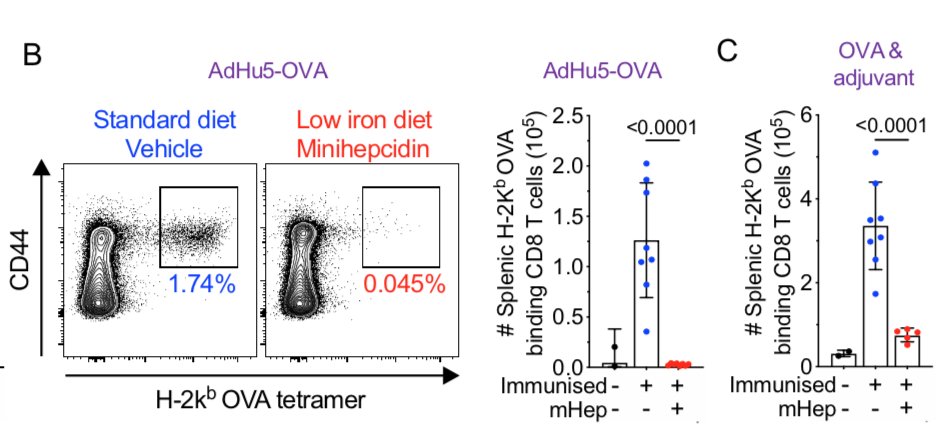
1/ I’m hugely excited to be able to share with you our paper ‘hepcidin-mediated hypoferremia disrupts immune responses to vaccination and infection’ @MedCellPress
cell.com/med/fulltext/S…
Thank you @Drakesmith_Lab @MRC_HIU @MRC_WIMM + our global collaborators! #Tweetorial time:
cell.com/med/fulltext/S…
Thank you @Drakesmith_Lab @MRC_HIU @MRC_WIMM + our global collaborators! #Tweetorial time:
2/ We know the immune system responds to nutrient availability #immunometabolism.
#irondeficiency (ID) is the most common micronutrient deficiency globally. How does ID influence immunity?
#irondeficiency (ID) is the most common micronutrient deficiency globally. How does ID influence immunity?
3/ ‘minihepcidin/mHep’ (mimetic of hepcidin) caused serum iron deficiency and suppressed the magnitude/quality of CD8, Tfh, GC and antibody responses to immunisations ⬇️. Injecting iron rescues the effect of ‘mHep’ ⬆️ 

4/ Showing that serum iron, controlled by hepcidin, is critical for adaptive immune responses
5/ How is T cell iron acquisition regulated? In collab with Bruno Galy @DKFZ we found that cellular iron homeostasis regulators IRP1/2 are required to maintain transferrin receptor expression, iron uptake and proliferation of CD8s in vitro. 

6/ What do T cells need iron for? Iron deficient CD8 T cells had reduced proliferation/effector function, synthesised less ATP and had impaired mitochondrial metabolism. 

7/ But what about long term immunity? We found transient serum iron deficiency impaired CD8 memory and recall responses in mice (image= post boost T cell response).
Could iron deficiency as a child impair immune memory even when iron status normalises as an adult?
Could iron deficiency as a child impair immune memory even when iron status normalises as an adult?

8/ To explore if increasing iron availability can improve immunity we turned to a naturally iron deficient model with the help of Marie Lewis @UniofReading : piglets. Iron supplementation rescued low serum iron, anaemia and enhanced the antibody response to immunisation. 

9/ Is raised hepcidin immunosuppressive in humans? Mark D Fleming @BostonChildrens provided access to a cohort of IRIDA patients with mutations in TMPRSS6 causing high hepcidin + low serum iron.
IRIDA patients had reduced concentrations of antibodies against key human pathogens
IRIDA patients had reduced concentrations of antibodies against key human pathogens

10/ What does high hepcidin/low iron do in the context of viral infection? Mice infected with influenza virus and given mHep had poorer adaptive immunity, higher lung viral loads, increased histological lung inflammation and worse weight recovery. 

11/ Turning back to humans, we (and others) have observed patients with more severe COVID19 have lower serum iron ccforum.biomedcentral.com/articles/10.11… .
Could low serum iron not just be a product of disease severity, but also play a role in driving outcomes of infection?
Could low serum iron not just be a product of disease severity, but also play a role in driving outcomes of infection?
12/ All in all our results show that serum iron, regulated by hepcidin, is an important and potentially targetable control point for immunity. Relevant for global health, vaccine efficacy, and chronic inflammatory diseases.
Thanks again to all our collaborators who helped make this happen (on and off twitter) ! @JackTan19 @munawarabbas93 @sarah_wideman @DocAShah @AEArmitage1 @jtarezes @AE_Preston @MeganRTeh @caitlin_naylor6 @maosalio @S1monJDraper
Also @LindaVSinclair and @LabDac 😁
• • •
Missing some Tweet in this thread? You can try to
force a refresh


